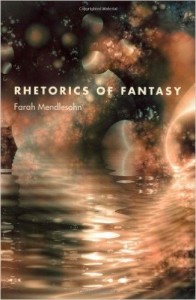Farah Mendlesohn takes fantasy seriously. Other scholars may tend to skip over the genre, or feel the need to explain or excuse their focus on popular fiction, but she takes for granted the worthiness of a body of literature which relies on the creation of “a sense of wonder.” And why not? An in-depth examination of the construction of some of the most inventive and influential books of the modern age can only lead to greater understanding of the mysterious task of the writer: to shape words in a way that shapes us.
In-depth it is. Focusing on the “what and how” of the genre (rather than, say, feminist polemics or psychological analysis), Rhetorics of Fantasy is densely packed with examples drawn from dozens of works of fiction, both famous and obscure. No distinction is drawn between those published as for “children” and for “adults”; horror and gothic are also included as part of the mix. Mendlesohn uses these many examples to illustrate the four broad categories of fantasy in her taxonomy, as well as identifying works that seem to cross between categories or not to fit into any of them. Her goal is not to create a set of definitions which will end discussion, but to furnish a tool for considering the genre that will lead to more productive questions.
Her method is admirably open-minded, yet extremely precise — treating texts like the living things they are, instead of killing them with quick-and-easy judgments. Using elements of different categories does not condemn an author to ineptitude, for example; it can bring a quality of innovation and expansion if done with skill. Sharpening our awareness of the subtle dance between author, text, and reader can indeed be a useful jumping-off point for asking how and why a particular book works — or doesn’t. Authors who are able to sense and work with the needs of the category they are operating within, it seems, are more successful than those who clumsily ignore or naively transgress them.
Sometimes I did wish that Mendlesohn had a more lucid and ear-pleasing prose style, particularly when the word “download” was repeatedly used in the most incongruous contexts — Tolkien downloading information to the reader? Perhaps this is an artefact of science fiction criticism, which is Mendlesohn’s primary profession. And Rhetorics is after all not a work of art itself, but, as she says, “an extended thought experiment.”
This is a book for study, not for skimming. The casual reader is unlikely to have read all the books cited, which adds another level of difficulty to the very dense and convoluted arguments; Mendlesohn generally jumps right into whatever incident or aspect is relevant, rather than giving much space to plot summary. Don’t dip into Rhetorics looking for quick book recommendations, for you will surely be frustrated. And if you don’t care much to think about how or why books work their magic, as long as they do it, you won’t be interested. But if you’re a critic or a scholar, professional or self-proclaimed, it’s a must-read. You may not agree with everything Mendlesohn says, but that won’t bother her a bit.
(Wesleyan, 2008)

